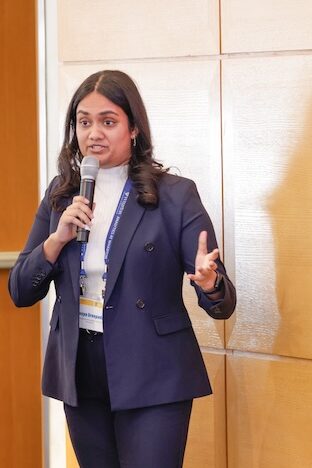
In Invisible Women: Data Bias in a World Designed for Men, Caroline Criado Perez notes that the default perspective for virtually all data collection and analysis is male. (Hence crash test dummies being designed to mimic male bodies, air conditioning systems relying on a model of the male metabolism, and women’s unique heart attack symptoms other than chest pain — like nausea and back pain — often going unrecognized, even by women experiencing them.)
Nearly a decade ago, a group of women at Stanford decided to address this issue by convening a one-day technical conference on data science; that meeting has now grown into a worldwide movement, with hundreds of sister conferences each year — a tradition in which Penn Engineering is proud to take part.
By 2030, Women in Data Science (WiDS), the non-profit that spun out of that early meeting, hopes to achieve 30% representation of women in data science globally. For Susan Davidson, Weiss Professor in Computer and Information Science (CIS) and a co-chair of the annual WiDS @ Penn conference, the benefits of participating in WiDS go beyond just networking. “To see women who are successful in your field is extremely encouraging,” says Davidson.
This year, Penn Engineering partnered with Analytics at Wharton (AAW) and the Penn Museum to co-host the fifth annual WiDS @ Penn conference, bringing together dozens of women from across the University and beyond to learn about the latest applications of data science in topics as diverse as online education and health care.
“It gave me the opportunity to not only show others what it means to be a data scientist,” says Lasya Sreepada, a doctoral student in Bioengineering, who presented her work studying early-onset Alzheimer’s disease using large data sets, “but also what it means to be a woman applying data science to integrate multiple disciplines spanning neuroscience, genomics and radiology.”
Penn Engineering students from all levels of their academic careers participated, from Aashika Vishwanath, a sophomore in CIS, president of the Wharton Undergraduate Data Analytics Club and senior data science consultant at Wharton Analytics Fellows, who shared her work developing an AI-powered teaching assistant, to Betty Xu, a master’s student in Electrical and Systems Engineering, who collaborated with the Wharton Neuroscience Initiative to study financial decision making. “Data can help us know the unknown in every field,” says Xu. “You can be a great data scientist no matter your background.”
Read the full story in Penn Engineering Today.
